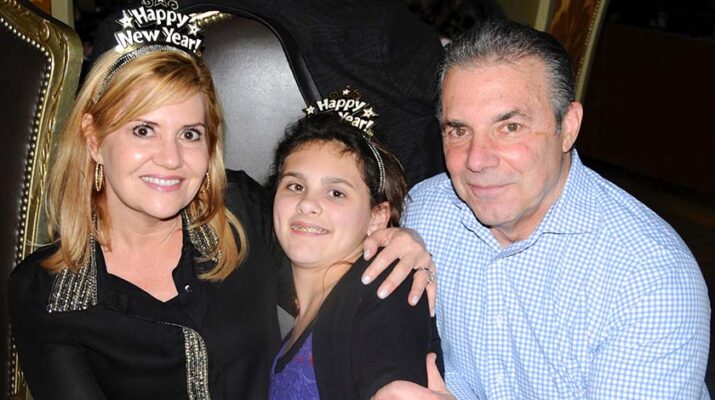Author shares means of dealing with the loss of a loved one
By Deborah Jeanne Sergeant
In 2013, Joe DiNardo, an attorney and founder of Counsel Financial in Buffalo, could scarcely imagine that his wife, Marcia’s “stomachache” was really a symptom of pancreatic cancer.
Within days, Marcia appeared jaundiced, prompting the couple to seek medical attention.
The problem seemed to be gallstones. However, none proved present. The eventual cancer diagnosis stunned the DiNardos.
Within days, providers at Roswell Park Cancer Comprehensive Cancer Center spotted a shadow on Marcia’s liver that would indicate stage 4 pancreatic cancer. The second opinion at Mount Sinai in New York City confirmed the diagnosis changed from stage 1 to 4, meaning that chemotherapy but not surgery was in order. The couple returned to Roswell so that Marcia could receive treatment near their Williamsville home.
All of this transpired within just one week, turning upside down the lives of Joe, Marcia and their then 13-year-old, Julianna.
“You never could have imagined it,” Joe DiNardo said. “Marcia was healthy, beautiful, energetic. She never got sick. Suddenly, this happened.”
As her chemotherapy treatments progressed, the chemicals built up in Marcia’s system. Joe could do little as he watched his wife suffer while she had likely only six months or less to live.
DiNardo felt that he should not share that fact with Marcia so she would not lose hope. But they both “had this intuitive sense,” DiNardo said, that their life together would not be long.
Marcia endured eight weeks of weekly treatments for her first round of chemotherapy. By the end of the fifth week, she could barely walk.
Beating all the odds, Marcia lived for two years after her diagnosis. Her health would stabilize periodically, but each time the cancer returned, it meant a different cocktail of chemotherapy drugs until her providers ran out of options. Near the end of her life, Marcia received an experimental but ineffective therapy.
“Toward the last few months, she had no options; she wasn’t well,” DiNardo said. “She went from 115 pounds to 87. She was just skin on a skeleton but still tried to get up every day and hug our daughter.”
She wanted to take one last vacation with the extended family, so the DiNardos rented a house in Fort Myers. Marcia spent the first few days recuperating from the flight. Then she decided to go shopping, ostensibly so she would have smaller clothing that fit her after losing so much weight, but also to have one last outing with Julianna; their nanny, Erin Doepp-Shapiro; the nanny’s daughter, Hayley Rinaldo; and nieces who also came on the vacation.
When Marcia later began to vomit blood, it became clear that she needed more medical care than of the nurse tending her.
Marcia asked her husband point-blank if she would recover. The couple had always said they would tell each other the truth no matter what.
DiNardo told her, “I don’t think you’re getting better.”
She turned to the window and said, “Oh,” accepting that the end was close.
The next day, the family arranged an emergency flight home so she could rest comfortably with hospice care.
Within days, Marcia’s blood pressure lowered and her pulse sped up: signs she would not live long. Her family said their goodbyes. She surprised everyone by sitting up to hug Julianna.
“Everyone was around her and I held her hand,” DiNardo said. “I whispered things to her, telling her it was OK. And we were OK. She was free to go whenever she wanted to. I heard the rattle of her final breath, a deep long breath, and in a few seconds, she transitioned out.”
On March 3, 2015, Marcia died holding her husband’s hand.
“It was heartbreaking to see someone you love suddenly not be there,” DiNardo said.
To cope with the grief, DiNardo turned to vipassana (insight) meditation, which he had begun practicing in 1971. He had studied under meditation teachers from the West and from India and Thailand. Mindfulness helped him feel close to Marcia.
“The practice of being silent and focused and allowing emotions and thoughts to arise and pass away in formal practice, gives you an openness to whatever happens in your life that people don’t normally have,” DiNardo said. “I felt this experience was the most powerful single experience that I’d ever had. I felt like right there that the person I loved most in the world transitioned out of her body. It’s awe-inspiring, as sad as it is.”
He also credits his circle of family and friends with working through his grief.
To help him process Marcia’s coming death, he began writing a letter to her.
The letter formed the eulogy that he read at her funeral. Afterwards, many people began asking for a copy. Eventually, DiNardo wrote a small memoir, “The Letter to My Wife,” which is now available on Amazon. He has also written “Mindfulness Matters for Everyone” (also on Amazon) to share the benefits of the practice.
“Both books give you a clearer picture of my thinking and my practice and our relationship,” he said.
He has taught mindfulness at Roswell Park for the past three and a half years and aided in forming their mindfulness program.
“Mindfulness is a simple thing, but it’s not easy,” DiNardo said. “It involves looking at fears, pain and suffering and many people are not so sure they want to do it.”
Working through emotions with mindfulness has helped him face the biggest challenge of his life with fortitude as well as thankfulness for the time he shared with Marcia.
Featured image: Joe DiNardo with his late wife, Marcia, and daughter Julianna during a New Year’s party in 2010. He became a cancer advocate after his wife died of pancreatic cancer in 2015. He has written books and taught mindfulness at Roswell Park. Photo provided.

